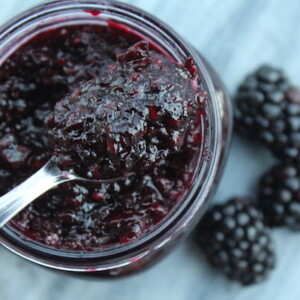Blackberry Jam Recipe Without Pectin
Blackberry jam is a classic preserve made with just berries, sugar, and time. This no-pectin version highlights the bold flavor of summer blackberries in a thick, spreadable jam that's perfect on toast or stirred into yogurt.
Servings: 48 servings, makes 5 to 6 half pint (8oz) jars
Ingredients
- 6 cups mashed blackberries see note
- 4 cups granulated sugar
- 2 tablespoons lemon juice optional, see notes
Instructions
- Prepare the canning setup: Wash and sterilize 6 to 7 half-pint jars. Place new lids in hot water (not boiling) and prepare your boiling water bath canner. Keep everything hot until ready to fill.
- Crush the berries: Rinse and sort your fresh blackberries, removing any stems or debris. Use a potato masher to crush them in a large mixing bowl or directly in the jam pot. It generally takes 2 cups whole fruit to make 1 cup mashed.
- Combine fruit and sugar: Place the crushed blackberries in a large, deep jam pot. Stir in the sugar and optional lemon juice (if using, see notes). Mix thoroughly to help the sugar dissolve slightly before heating.
- Bring to a boil: Turn the heat to medium-high and bring the mixture to a steady boil, stirring frequently to prevent scorching. Blackberry jam tends to foam quite a bit, so stay nearby and stir often.
- Cook to gel stage: Continue boiling the jam, stirring constantly, until it thickens and reaches gel stage. This typically takes 20 to 30 minutes, but times vary. Test for doneness using one or more of the following methods (see notes).
- Remove from heat and skim foam: Once gel stage is reached, remove the pot from heat and skim off any remaining foam if desired.
- Ladle into jars: Carefully ladle the hot jam into prepared jars, leaving ¼ inch headspace. Wipe the rims with a clean damp cloth, apply lids and screw on bands until fingertip tight.
- Process in a water bath canner: Place the jars in the boiling water bath canner, ensuring they’re fully submerged with at least 1–2 inches of water above the lids.Process both pint and half pint jars for 10 minutes, or 15 minutes if above 6,000 feet in elevation.
- Cool and store: After processing, remove jars and let them sit undisturbed for 12–24 hours. Check seals, label, and store in a cool, dark place for up to 18 months.
Notes
Blackberry Measurements: Generally, 1 cup crushed berries is equal to 2 cups whole fruit. A cup of crushed fruit is about ½ pound, so for this recipe you’ll need about 3 lbs whole fruit or 12 cups as purchased.
Lemon Juice (Optional): Blackberries are naturally high in acid, so added lemon juice isn't required for safety. However, 1 to 2 tablespoons of fresh lemon juice can brighten the flavor and help balance sweeter cultivated berries. Skip it if your berries are already quite tart.
Testing for Gel Stage:
- Plate Test: Place a spoon and plate in the freezer. When you think the jam is ready, spoon a small amount onto the plate. After 30 seconds, run your finger through it. If it wrinkles and holds a line, it’s done.
- Thermometer Test: Jam sets at 220°F at sea level. Subtract 2°F for every 1,000 feet of elevation. Use an instant-read thermometer to check.
- Sheeting Test: Dip a spoon into the jam, hold it sideways over the pot, and watch how the jam falls. If it falls off in a sheet or a slow blob (not individual droplets), it’s likely ready.
Nutrition
Calories: 72kcal | Carbohydrates: 18g | Protein: 0.3g | Fat: 0.1g | Saturated Fat: 0.003g | Polyunsaturated Fat: 0.1g | Monounsaturated Fat: 0.01g | Sodium: 0.4mg | Potassium: 30mg | Fiber: 1g | Sugar: 18g | Vitamin A: 39IU | Vitamin C: 4mg | Calcium: 5mg | Iron: 0.1mg
